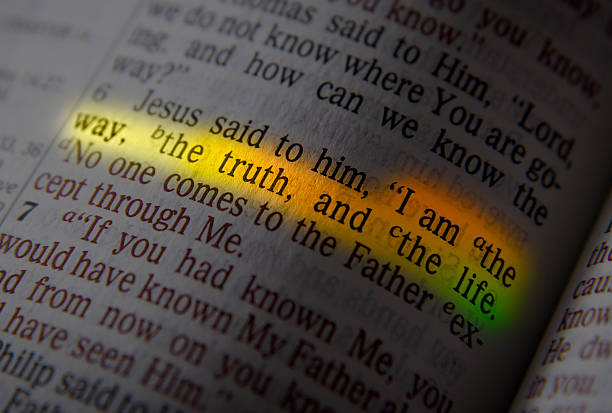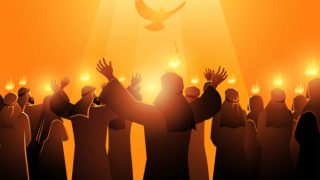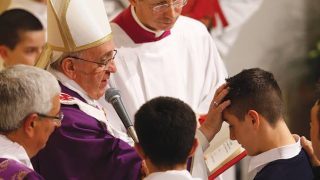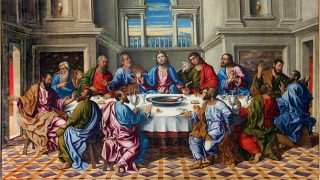
WHY WOULD CHRIST CONSIDER US WORTHY TO BE WHERE HE IS?
HOMILY FOR FIFTH SUNDAY OF EASTER, YEAR A. Readings: Acts 6:1-7; Psalm 33; 1 Peter 2:4-9 and John 14:1-12.
The liturgy of today anticipates the Solemnity of the Ascension of our Lord into heaven, as Christ speaks in his farewell discourse of the many rooms prepared for us in his Father’s house. It reminds us of who we are, “The chosen race and the royal priesthood, a holy nation and God’s own people” (1 Peter 2:9) who would be and reign with Christ in His Kingdom. But why would Christ consider us worthy to be where he is?
Today, Christ assures us of the Father’s kingdom as seen in the gospel pericope, “Let not your hearts be troubled… there are many rooms in my Father’s house… so that where I am you may be also… I am the way, the truth and the life” (Jn 14:1-7). The disciples had much to trouble them as Christ had earlier said, “I will be with you a little while longer… where I am going, you cannot come” (Jn 13:33). They have left everything to follow Christ and so, it must be terribly disorienting to hear Christ say that he is leaving them. As Christ prepares the minds of his disciples for his Ascension to the Father, he made them understand that he is not abandoning them. As he said to them last Sunday, “I am the door of the sheep; if anyone enters by me, he will be saved and will go in and out and find pasture” (Jn 10:9) he says to us today “No one comes to the Father except through me” (14:6). Even if many are offended by the exclusiveness of this statement, God chose his Son as the one to convey grace, so it stands to reason that the person who refuses the Son also refuses the grace that he offers. More to this is that Christ is saying he is the channel of blessings and will dispense grace in accord with the Father’s will.
This is the grace we receive in the sacrament of Baptism, which makes us children of God and enable us to call God Abba Father. It is on this note St. Paul will say, “We are heirs of the Father, we are joint-heirs with the Son, we are children of the Kingdom, we are family and we are one” (Rm 18:17). As children of God, Christ considers us worthy, to be where he is. He is the cornerstone, going back to the Father to prepare a room for us. To be in this room, we must pass through Him. This discourse led to Thomas and Philip’s curiosity on the relationship between the Father and the Son when Philip said, “Lord, show us the Father and we shall be satisfied” (v. 8). Philip portrays a soul longing for God; he demonstrates the comfort and assurance we have in God’s presence, a reminder of the psalm of David, when he was in the wilderness, he said, “O God, you are my God, for you I long; for you my soul is thirsty. My body pines for you like a dry, weary land without water.” (Ps 62). This expression of Philip is also seen in the words of St. Augustine who said, “Our hearts are restless, until they rest in God.” Philip’s longing was to see the face of God, and if he could achieve this, all his longings would be satisfied. Jesus replied, “He who has seen me has seen the Father… Do you not believe that I am in the Father and the Father is in me?” (v. 10). In Christ is the fullness of God’s revelation to humanity.
What about we that did not have physical contact with Christ as the Apostles did? We do not have the opportunity like the Apostles of seeing him, touching him, dinning with him physically, but we always have him present with us, which we can see only with the eyes of faith. Christ is present in his Word (the Scripture), in it we can touch him, we can feel him, we can embrace him; we can talk to him and he talk to us. He is present in the Eucharist, in other sacraments and he is present in each one of us. These are areas we can quench our hunger and thirst for God, and become satisfied. Besides, the prologue to this gospel prepared us for this statement by saying, “No one has seen God at any time. The one and only Son who is in the bosom of the Father has made him known” (Jn 1:18).
While Christ speaks of the unity that exist between himself and the Father, the first reading from the Acts of the Apostles presents to us division that arose from the Hellenist (Christian converts among the Jews who have returned to Judea after having lived abroad in the Greek world) and they complained of their widows not getting a fair share of the church’s social services. The drama that unfolded led to the election of the seven Deacons, which has an historical background of the Order of Deacons. They were to take care of the social needs of the early Church. At this dispute, the solution given by the Apostles gives important dimension of the Church’s life: striking a balance between the prayer and apostolic or service life of the church. The social need of the church should not be taken for granted. If left unattended to, they could undermine the work of God.
Other dimension of the reading could be a reminder not to forget who we are or neglect our primary calling. We should not be distracted from our calling as Peter rightly said, “It would not be right for us to neglect the word of God to serve tables…we will hand over this duty and devote ourselves to prayer and to the service of the word of God.” A beautiful way to describe the relationship between the prayer life and apostolic life of a Christian is seen in the analogy of the two lungs, legs or hands. If one fails, it affects the other. Hence, we must strive to make sure both are in order. Prayer and preaching the word of God was the primary importance to the apostles; but service to the widows and the needy in the community was also vital, and there was need to strike a balance between these two. If more attention is given to the social needs, the spiritual needs will suffer for it. To strike this balance, we need one another because alone we cannot do it. Even Christ needed the apostles to achieve his mission, while they were increasing in number; the apostles needed the deacons to help in some aspect. Similarly, Christ needs us for this mission.
Christ needs and have chosen us for the spreading of his word as Peter puts it in the Second reading, “You are a chosen race, a royal priesthood, a holy nation and God’s own people” (1 Peter 2:9) Here, Peter highlights our participation in the priesthood of Christ by the virtue of our baptism. Baptism configures us to become “priests.” Peter also uses the imagery of Christ as the cornerstone and we as the living stones making up a living house of God. An implication of us taking some responsibility for spreading the word of God and building the kingdom of God here on earth by our daily conducts and attitudes.
In the words of John Wesley, we build up rooms in heaven when “We do all the good we can, in all the ways we can, in all the places we can, at all times we can, to all people we can as long as we can.” We can be of help to others attaining these rooms. Doing so, we practice the Lord’s prayer, “Thy kingdom come, thy will be done on earth as it is in heaven.”
Happy Sunday and God bless you!
Fr. Ken Dogbo, OSJ










